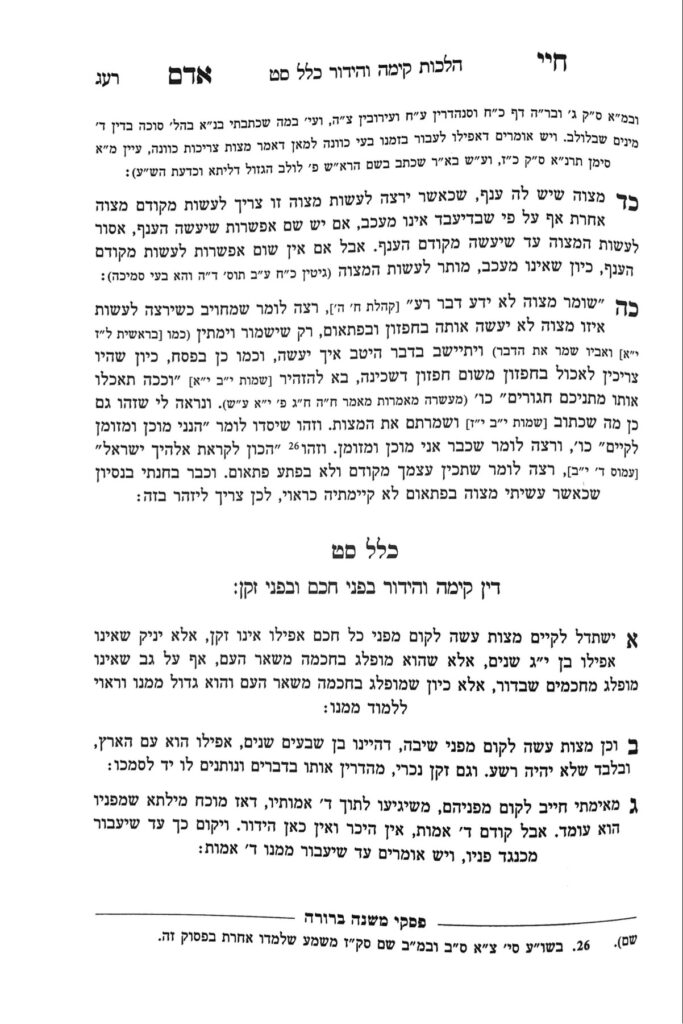We are beginning siman 24. The Chayei Adam discusses the situation of a mitzvah which has a specific element to it which a person is not able to do at the moment. The question is whether they should wait to perform the mitzvah until they are able to fulfill that specific element as well, whether they should not wait at all, or whether they should refrain from performing the mitzvah entirely.
The source for this question is in regards to the mitzvah of semicha on a korban. Semicha (placing both hands on the korban, leaning down, and reciting vidui) is not meakeiv. The Gemara refers to semicha as the shiyarei mitzvah, the extra parts of the mitzvah. However, the Gemara says that if one does not do semicha, it is as though one did not attain a full kaparah (see further in shiur 1429).
The Chayei Adam writes that if one will not be able to fulfill the additional element at a different time, they are considered an anus (forced by circumstances beyond their control) and may fulfill the mitzvah immediately. If they will be able to fulfill the additional element at a later time, it is wrong to perform the mitzvah until they are able to fulfill the mitzvah in its entirety. Nonetheless, if they perform the mitzvah without waiting, they were yotzei the mitzvah.
This point is also discussed regarding shechita on Yom Tov where a person does not have dirt to perform kisui hadam. Although a person who does not have dirt is exempt from the mitzvah because they have no other choice, it is wrong to put oneself into such a situation lechatchilla. Therefore, if one does not have dirt available, it is assur for them to perform shechita on Yom Tov.
A practical example of this question regards tzitzis. If one has a garment with four corners, they are chayav to put tzitzis on it. If they do not have tzitzis available, they are an anus and exempt from tzitzis. If they have tzitzis available but do not put them on the garment, it is wrong for them to wear the garment until they place the tzitzis on it. Some rishonim understand this case to be parallel to the case of semicha above, where we learned that it is wrong to bring the korban until one can perform semicha with it..
Others disagree and hold that the comparison is incorrect, and tzitzis is actually a contradiction to semicha. They explain that the mitzvah is to put tzitzis on a garment of four corners, but there is no issur to refrain from wearing tzitzis. Therefore, the halacha is that if one’s tzitzis tear on Shabbos, as it is assur deoraysa (melacha of koshair) to string new tzitzis into the garment, and the asei of tzitzis will not override the issur deoraysa, they may keep wearing the garment, because over Shabbos they are an anus. After Shabbos they will restring the tzitzis. We see that regarding tzitzis, the ability to restring the tzitzis later still allows a person to continue wearing the garment on Shabbos, while regarding semicha, the ability to do semicha after Yom Tov prohibits one from bringing the korban over Yom Tov. Apparently, tzitzis and shechita are not the same. The achronim grapple with this contradiction and give various answers.
There are some achronim who disagree completely with the Chayei Adam, and hold that if the element of the mitzvah is not meakeiv, one may fulfill the mitzvah immediately without waiting until later. One should ask any practical questions to their rav.
Summary
If one wishes to perform a mitzvah which has an additional element to it, which they are not able to perform at the current time:
- If they will not be able to perform the additional element later, they should perform the mitzvah immediately;
- If they will be able to perform the additional element later, they must wait until they can fulfill the mitzvah in its entirety.
- Nonetheless, if they did not wait, they are yotzei the mitzvah.
One should ask any practical questions to their rav.



